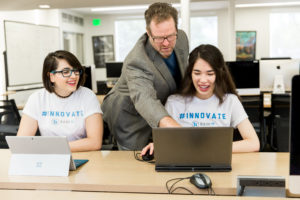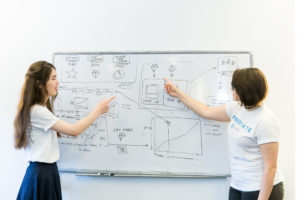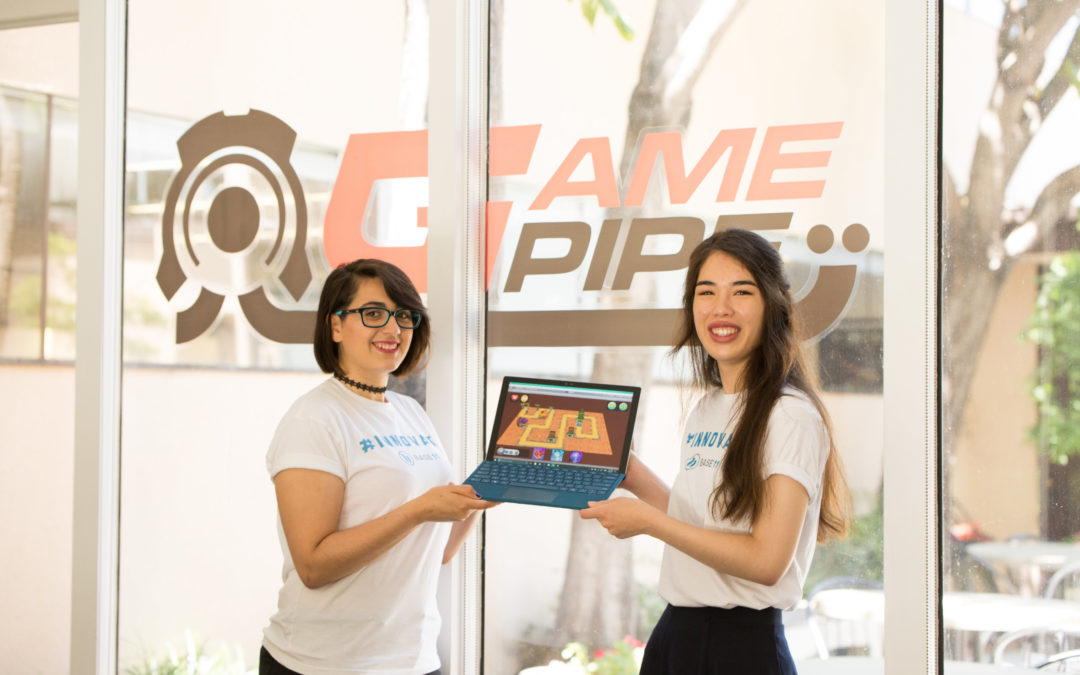Neither Tiffany Streitenberger nor Iliana Douraghi would describe themselves as gamers. And that’s part of what made their experience in USC’s GamePipe Lab over the summer so impactful.
The two community college students spent 10 weeks as paid Base 11 fellows in the USC Computer Science Program, building out levels of a tower defense game.
“The experience redefined my concept of gaming and gave me a taste of what game development can be,” said Tiffany, who is studying computer science at Cañada College. During the program, she sat in on university lectures, learned about how virtual reality works, discovered how programming and graphics come together, and saw firsthand how the mobile games she likes to play get created. And it turns out, it takes some serious collaboration.
“Teamwork was a crucial part of the program because we needed pieces of work from one another to to create the final product,” said Tiffany. “Iliana and I often play tested and edited each other’s work in order to receive feedback from a different perspective and improve upon the game levels.”

In addition to working together, the two worked with a multi-disciplinary team that included economists, accountants, computer scientists, graphic designers, and engineers. It was also a geographically distributed team, with the students often working late into the night and collaborating with someone halfway around the world in China.
“Working in a whole new environment can be difficult at first,” said Tiffany. “However the GamePipe Lab and USC brought a welcoming atmosphere that provided us with numerous resources that helped us get accustomed and develop the game.”

Tiffany and Iliana used SVN and spreadsheet scheduling to adjust the timing and location of monsters and other obstacles in each level of the game.
“They also learned how to make the designs export from an Excel sheet using an XML exporter, which resulted in a faster turnaround for iterations on the game,” explained Scott Easley, associate director of the GamePipe Lab.
The students then had to play each level between their adjustments to test for the right balance between challenge and fun in the game.
“We wanted them to understand that you can strip down any game concept into an engineering process,” said Easley. “But at the same time we wanted to challenge them to try and make each wave of the game a story.”
Iliana, who is studying engineering at Grossmont College, enjoyed the challenge of digging into the details of the gaming and fixing bugs, as well as seeing the big picture and how all of the pieces come together in an enjoyable experience for the gamers. “Not only did I learn about all the thought processes and that goes into game level design and development, but I was also able to gain the experience of what it’s like to be in a lead engineering position for a company.”
Though the experience didn’t turn them into avid gamers, both Tiffany and Iliana say it broadened their horizons about what they can do with their skills.
“I realized programming is not the only path available for me,” said Tiffany, who is interested in combining her artistic side with her computer science skills in the future. “Now I’ve been exposed to a whole different genre of computer science. Developing the game sparked my interests in pursuing the field of game development/graphics.”
Iliana, who dreams of one day working as a Disney Imagineer, agreed that the program had been eye-opening. “I had never considered a path in game design because I thought it was just for people who were computer programmers,” she said. “But now that I know the most successful games have a team of engineers, it certainly opens more doors and paths for me to explore in my future.”
Applications for 2018 summer fellowships are now open. Visit www.base11.com/summer.

